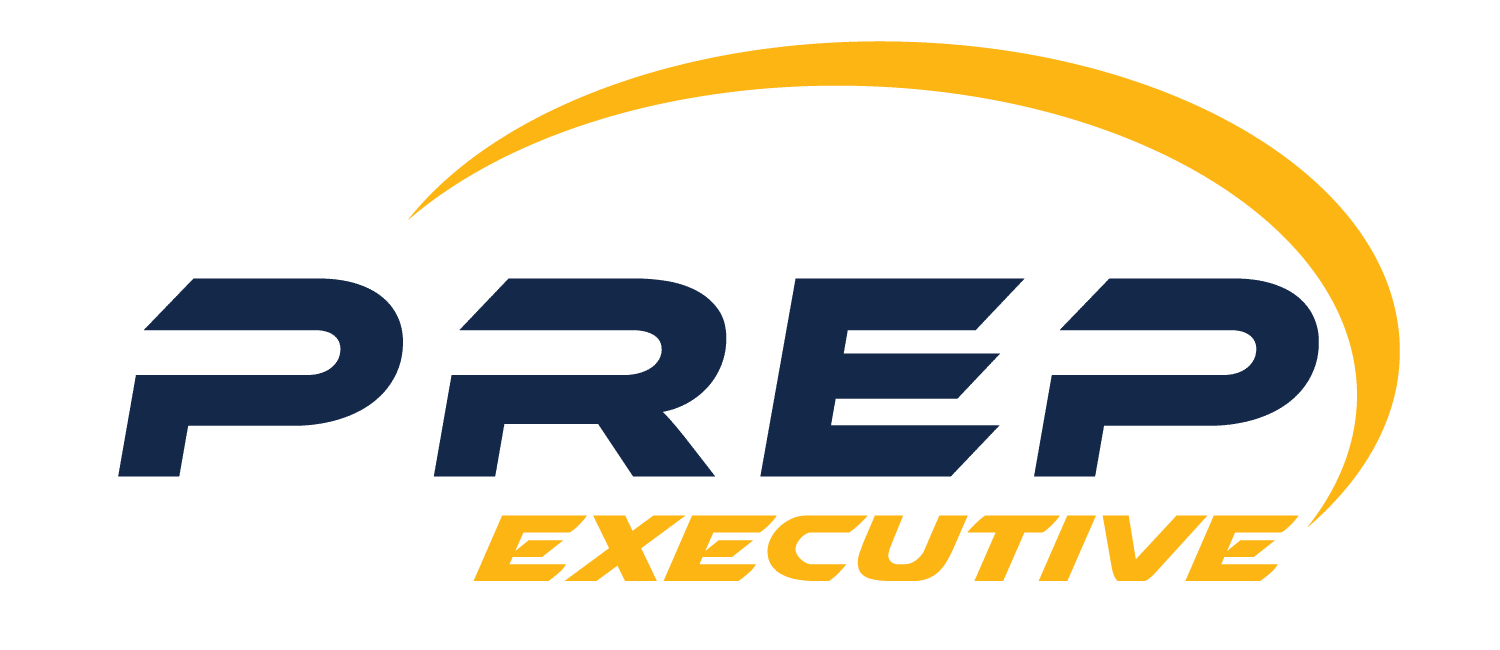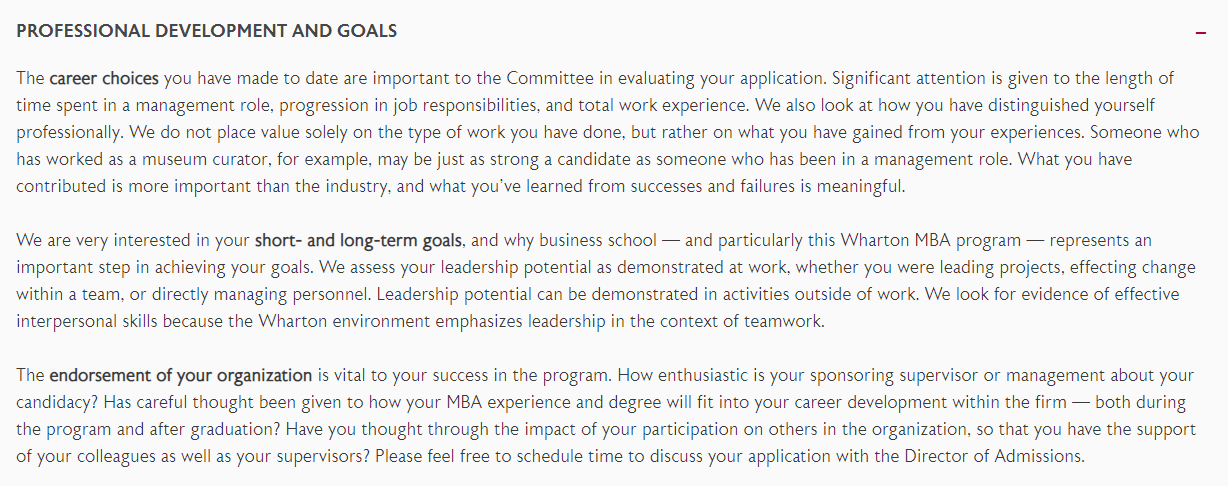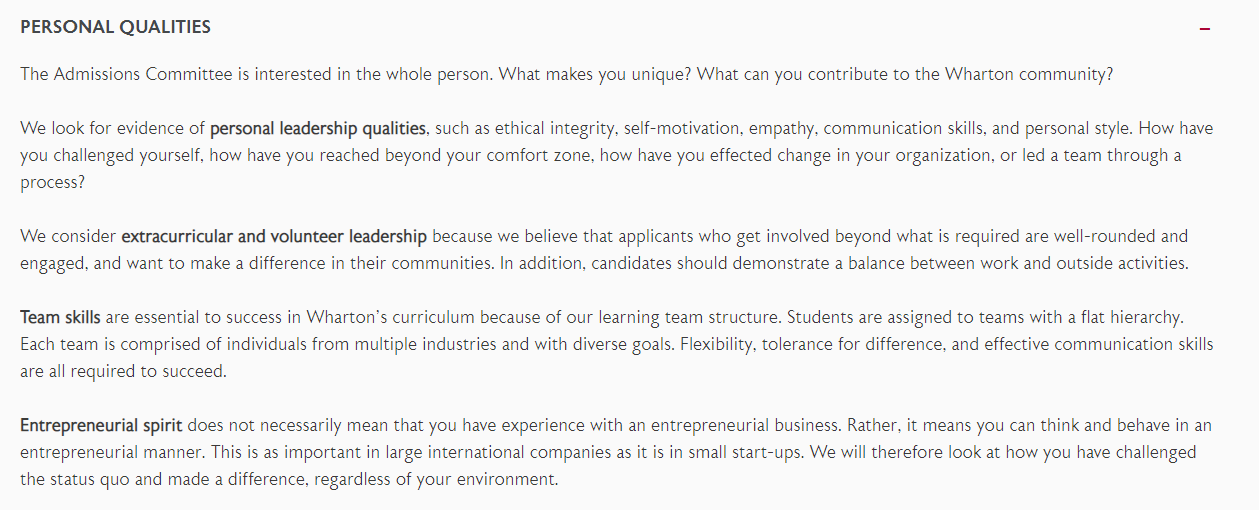The Wharton Executive MBA program is one of the most difficult EMBA programs to get into in the world. As a global leader in business, the Wharton EMBA program combines a general business curriculum focused on financial analytical with a dazzling array of electives and specialized courses.
The most unique aspect of the Wharton Executive MBA program is the every other week residential format that allows you to sample true on campus life while completing your degree.
Our Wharton EMBA Executive Summary is an overview of the program’s rounds, deadlines, requirements, and specializations–all on one page.
We created the Executive Summary series to give you an outline of the requirements from the perspective of an admissions consultant. In other words, the Wharton EMBA Executive Summary includes the primary requirements and information you should be concerned with when creating your application; it does not include every detail of the admissions process.
What the summary does include is a profile comparison, side-by-side with the admissions requirements, as well as excerpts of Wharton’s preferences. We’ve also provided a list of program highlights and specializations to help you identify whether you will be a “good fit” for the program based on your background and their offerings.
All information comes directly from the Wharton EMBA program website and is current as of the last updated date on the top of this page. Be sure to confirm the requirements on Wharton’s website.
Wharton EMBA Program Summary
Length: 24 months
Class session length: Year 1 is May to May. Year 2 is June to May.
Weekly schedule: Alternate Friday/Saturday weekends with several extended sessions, plus a one-week global experience
Program starts with an initial week long meeting in Philadelphia to immerse you in classes and orient you to the program and your classmates
Curriculum: 10 credits core + 9 credits elective
Tuition and fees (for 2 years): $214,800 (up 1.85% from the previous year)
Tuition and fees include some course materials and all required program-related housing and meals. Transportation, airfare for the required Global Business Week, and parking are not included.
Campus locations: Philadelphia and San Francisco

Image: Wharton Executive MBA, University of Pennsylvania
Wharton EMBA Program Highlights
Wharton’s reputation as “the finance school” is well earned. The rigorous and relevant data analysis that drives Wharton Finance is true of the entire School. Wharton analytics fuels data-driven decision making, helping you to become a visionary and pragmatic business leader in any career you choose.
When you complete your two years in the Wharton MBA for Executives, you are awarded the same Wharton MBA degree received by those who complete Wharton’s traditional full-time program. The curriculum is the same rigorous curriculum required in the traditional MBA program.
There is no difference in the degree earned by executive and full-time MBA students. The primary difference is the every-other-weekend residential format of the program which allows for a different on-campus experience, as well as the kind of career services we provide, which are more suited to a working professional.
At Wharton, 45 percent of the classes are electives, and each class has the opportunity during the first year to select the electives offered to them in the second year.
Wharton EMBA Class of 2021:
- Total class size: 236
- Average age: 36
- Average year work experience: 12

Image: Wharton Executive MBA, University of Pennsylvania
Wharton EMBA Specializations (Majors) and Electives
Majors are not required in the executive MBA program; however, some Wharton majors can be earned by executive students as a result of pursuing their area of interest.
A few of the majors that have been earned within the EMBA program are listed below.
- Entrepreneurial management
- Finance
- Management
- Marketing
- Strategic management
Each MBA for Executives class participates in the selection of a set of electives from more than 200 graduate courses offered. You then choose from this subset of courses, with the option to switch campuses for one term if a desired course is not offered in your primary program location.

Image: Wharton Executive MBA, University of Pennsylvania
Wharton EMBA International Opportunities
EMBA Global Business Week (2nd year): a required week-long course in a country facing specific business challenges, with a choice of up to five different study destinations.
Global Modular Courses: an immersive elective delivered as short, full-credit and half-credit courses in an intensive workshop format in a country relevant for the topic (e.g. health care and business in Ethiopia).

Image: Wharton Executive MBA, University of Pennsylvania
Wharton EMBA Deadlines
The Wharton MBA for Executives program has two application rounds.
Round 1
Application Deadline: December 2, 2020 (11:59 p.m. PST)*
Decision Release Date: Wednesday, January 20, 2021
Round 2
Application Deadline: February 10, 2021 (11:59 p.m. PST)*
Decision Release Date: Wednesday, March 24, 2021
Any materials you submit in hard copy (e.g. official transcripts and letter of sponsorship) must arrive in their office by 5 p.m. on the day of the deadline.
Admissions made on a rolling basis: No

Image: Wharton Executive MBA, University of Pennsylvania
Wharton EMBA Application Requirements
1. Online application
Admission to the Wharton MBA Program for Executives requires the completion of an online application, which includes the provision of background information: contact information (e.g., mailing address and phone number), biographical information, academic degrees earned, professional experience, and optional family information.
Class of 2021:
- Women: 32%
- Underrepresented minority students: 10%
- Countries represented: 26
- Average age: 36
- Only 9% under 30 and 15% over 40
- Average years work experience: 12
Typical class profile averages for most EMBA programs:
- 8 or more years of work experience
- 5 or more years in a managerial position
- Senior management experience or potential
2. Interview and Phone Chat
An (in-person) interview with a member of the Admissions Committee is required for all applicants to the Wharton MBA Program for Executives. You are strongly encouraged to schedule an interview before you complete your application, and you must have your interview scheduled by the application deadline. An early interview is strongly encouraged. All that is required to interview is your resume. In fact, we encourage you to start your application and come to your interview with questions.
Prior to your interview, the Admissions Committee is available to answer questions around your application and/or interview process through a phone chat. We strongly encourage you to take advantage of this additional opportunity.
Your phone chat, interview and visit will help you formulate what you want to include in your application.
You shouldn’t wait until you submit an application to schedule an interview. The interview is a chance for you to ask specific questions and to give us a full, more personal explanation of your professional background and interests. Many candidates find it convenient to plan a visit that includes both an interview and a program visit, which is an opportunity to sit in on a class and join current students at lunch.
3. Letters of Recommendation
The Admissions Committee requires two online recommendations from colleagues who are familiar with your work. Optimal sources for recommendations are your direct managers, who can give insight to the Committee on you as an employee. Other useful sources are clients or former employers.
4. Essays
You are required to prepare answers to the first three essay questions listed below. The fourth essay question is optional.
Essay Question 1 (Required; 750 word limit)
What are your career objectives and how will the Wharton MBA Program for Executives contribute to your attainment of this objective?
What Wharton says:
Essay Question 2 (Required; 750 word limit)
In his groundbreaking TedTalk “Are You a Giver or a Taker?” Adam Grant describes three primary personality types in the workplace: givers, takers, and matchers. Based on your understanding of yourself and our program, how do you intend to give and take as a student at Wharton?
What Wharton says:
Essay Question 3 (Required; 500 word limit)
Given your already demanding job and the desire to remain committed to important family and personal obligations, how do you plan to handle the additional demands on your time once you enroll?
What Wharton says:
Essay Question 4 (Optional; 500 word limit)
Please explain any extenuating circumstances of which the Admissions Committee should be aware (e.g., unexplained gaps in your work experience, choice of recommenders, inconsistent academic performance). You may also take this opportunity to share other defining aspects of your life that the Admissions Committee would not otherwise have learned from your application or resume.
What Wharton says:
5. Standardized Tests
All applicants must submit standardized test results by the application deadline to be considered for admission.
Applicants have the option of taking the:
- Graduate Management Admissions Test (GMAT)
- Graduate Record Examination (GRE)
- Executive Assessment (EA) if you have at least 10 years of work experience
There is no minimum score requirement for each test; however, test scores have proven to be a useful predictor of success in the quantitative courses that are an important foundation for the MBA for Executives program. All scores are valid for five years from the test date.
If you are uncertain or indifferent about which test to take, our preference would be the GMAT.
You may retake the test as many times as you want. Only the highest score will be used in your evaluation.
Class of 2021:
- Median GMAT score: 700
- Median 80% GMAT range: 640-740
6. Official Transcripts
The Wharton MBA Program for Executives requires receipt of official transcripts from all higher ed institutions listed in your application by the deadline.
You may upload an unofficial copy of your transcript(s) within your application as a placeholder, but the official original copies must be received by the office to which you are applying before your decision will be released.
Class of 2021:
Students holding advanced degrees: 53%
7. Sponsorship Letter
A letter of endorsement from your organization is a required part of your application. A decision on your application cannot be made until we receive this letter.
The hard copy (original) must be mailed to the office to which you are applying and a soft copy may be uploaded. The letter should be on the official letterhead of your organization and be signed by your sponsoring management, and it must indicate that the necessary time will be provided for you to attend.
If financial support will be provided, this should also be specified in the letter. For independent consultants and professionals, a letter of self-sponsorship is required.
For Fellows candidates, the amount of financial support must be included.
For most applicants, proposing and receiving sponsorship is a crucial part of the application process. While employer endorsement is a requirement for admission, financial sponsorship is at the discretion of the student’s organization. Financial sponsorship can send a strong signal of endorsement for an applicant and can return significant benefits to the sponsoring organization.
Approximately 70 percent of students receive full or partial financial support from their organization.
Class of 2021:
Sponsored by Employer (more than 50% financial support): 33%
Other Requirements
The following requirements have not been included on this list but may be required:
- Resume’
- Application fee
Be sure to confirm all program requirements on Wharton’s website.
Get the Advantage You Need for Wharton
Score higher on the GMAC EA with Prep Executive’s interactive course, expert live coaching, and more. It’s 100% risk-free with the 7 Day Money Back Guarantee.
You May Also Like…
Info

20 Questions About the Executive Assessment Exam Answered
Admissions exams change over time and the Executive Assessment (EA) exam is no different. In fact, since being...
Test

How to Prepare for the GMAC Executive Assessment
In this post, we're going to breakdown exactly how to prepare for the GMAC Executive Assessment (EA). There's lots of...
Programs

Which Schools Accept Executive Assessment?
As of June 2020, more than 90 business schools accept the Executive Assessment as an admissions test. Each business...












Hi, so if I fit Wharton’s student profile, what’s my likelihood of getting accepted?
Hi Jacquie, if you fit the profile, you have a possibility of getting accepted, but it’s not guaranteed. You will have a phone chat, which is to vet your “fit” for the program, as well as a formal interview. Your likelihood of getting accepted will also depend on your professional background and the incoming class mix Wharton wants. It’s really a holistic assessment.
Hope this helps!
Eden
should i take gmat or ea for wharton?
Hi Kata,
If you have 10 or more years of experience, Wharton will accept the EA for the Executive MBA program. If you have less than 10 years of experience, take the GMAT.
Thanks for your comment!
Eden